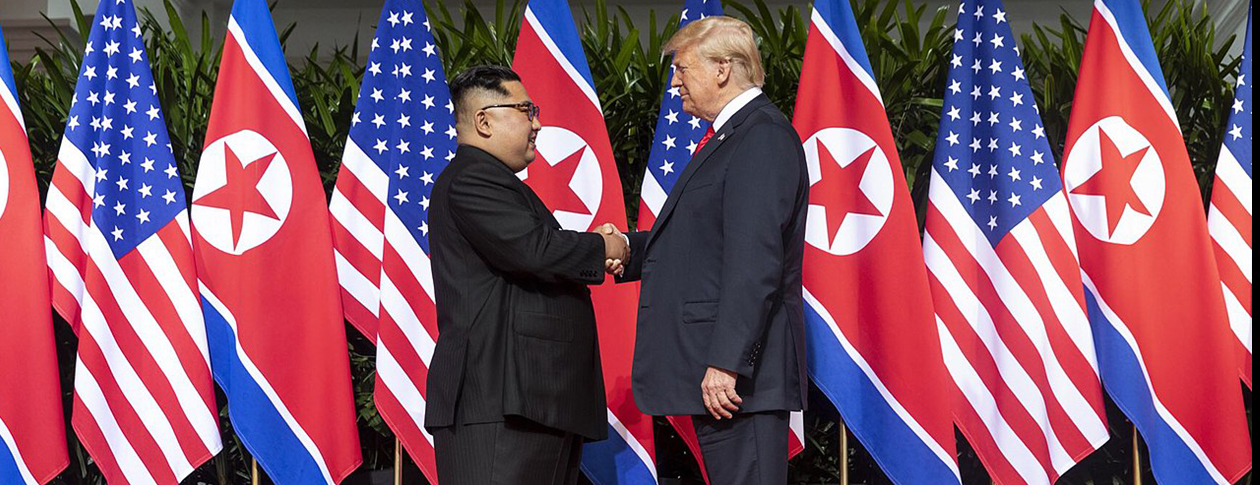It should now be obvious that the North Korean ruler has no intention of giving up his country’s growing nuclear weapons program. To insistently demand “complete denuclearization” from Kim Jung Un represents a foolish diplomatic expectation for the United States. Correspondingly, to plan realistically for the still expanding nuclear threat from Pyongyang, Washington should focus upon creating stable nuclear deterrence with that country.
For US President Trump, any upcoming negotiations with North Korea should be oriented toward capable struggles of “mind over mind,” rather than narrowly technical contests of mind over matter. Each side, at least as long as it can remain recognizably rational, will seek to achieve “escalation dominance.” At the same time, each side will strive for this objective without intentionally imperiling its core prospects for national survival.
What is required, going forward, is the creation of a stable nuclear deterrence regime between Washington and Pyongyang, and one that takes into proper account the expectations of both Moscow and Beijing.
Should this deterrence regime be allowed to fail, and should U.S. President Donald Trump sometime decide to undertake selective military actions against North Korea, the general contours of Kim Jung Un’s response are easy to project. Pyongyang, having available no preferable option to launching various forms of armed reprisal, could strike (a) the American homeland; (b) American military forces in the region, and/or (c) assorted other targets in Guam, Japan or South Korea.
If President Trump should ever decide to launch a conventional “defensive” first strike, the North Korean response could be “disproportionate.” In that case, the considered introduction of nuclear weapons into an already-volatile mix could not be excluded. If, on the other hand, President Trump’s defensive first strike against North Korea were observably less than massive, a fully rational adversary in Pyongyang might then still favor a limited reprisal.
Even if only fully rational adversaries were playing, any strategic “game” between Washington and Pyongyang would demand each player to strive relentlessly for “escalation dominance.” It would be in the unpracticed internal dynamics of any such rivalry that the prospect of mutual catastrophe could suddenly loom. Looking ahead, this unwanted outcome could be produced either in unexpected increments of escalation undertaken by one or both of the two national players, or, instead, by a sudden quantum leap in destructiveness.
In facing off against each other for “escalation dominance,” even under the most ideal assumptions of mutual rationality, both President Trump and President Kim Jong Un would have to concern themselves with possible miscalculations, errors in information, unauthorized uses of strategic weapons, mechanical or computer malfunctions and presumptively measureless nuances of cyber-defenses and cyber-war.
Mr. Trump will need to continuously bear in mind that it is scientifically impossible to assign mathematical probabilities to unique events. Because an authentic nuclear exchange between North Korea and the United States would represent precisely such a singular event, no one could predict with any meaningful measures of accuracy whether such a conflict would be more or less likely.
Should President Trump ever decide to strike North Korea preemptively on the erroneously optimistic assumption that his generals have “got everything covered,” he would need to be reminded of the classic warning offered by Carl von Clausewitz. Long before military planners could ever have even imagined a nuclear war, the insightful Prussian general and strategist cautioned leaders about “friction,” or “the difference between war on paper, and war as it actually is.”
Nuclear brinksmanship between Washington and Pyongyang would inevitably take place in uncharted waters, and still require both participating presidents to steer a steady course between escalation dominance and national survival.
Nuclear diplomacy is a “game” that America’s president must sometime be prepared to play with North Korea, but it is always a many-layered contest of strategy, and not merely a game of chance. In such a game, choosing the best course of action must ultimately depend upon what Mr. Trump would expect from the other side. In this intimidating contest of interdependent decision-making — an unpredictable clash of private wills that obligates the continuous recalculation of intersecting risks — it would be foolhardy ever to expect North Korean denuclearization.
American interests should be focused on more modest but still-realistic movements toward stable nuclear deterrence. Such intelligence-based initiatives would take into very close account the relevant expectations of both Russia and China.
Washington’s core responsibility here must be to influence only reasonable expectations of its North Korean adversary, and not to bet upon any hoped-for changes to Pyongyang’s principal security objectives.
Hope is never a promising strategy, especially in this particular theatre of potential conflict.


























